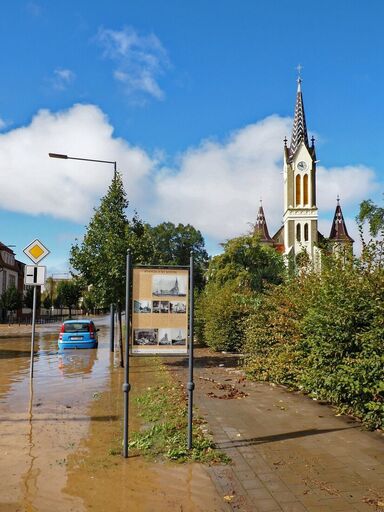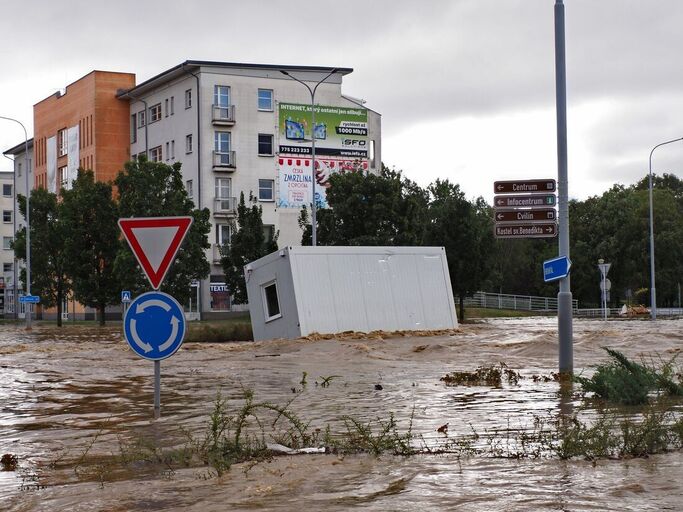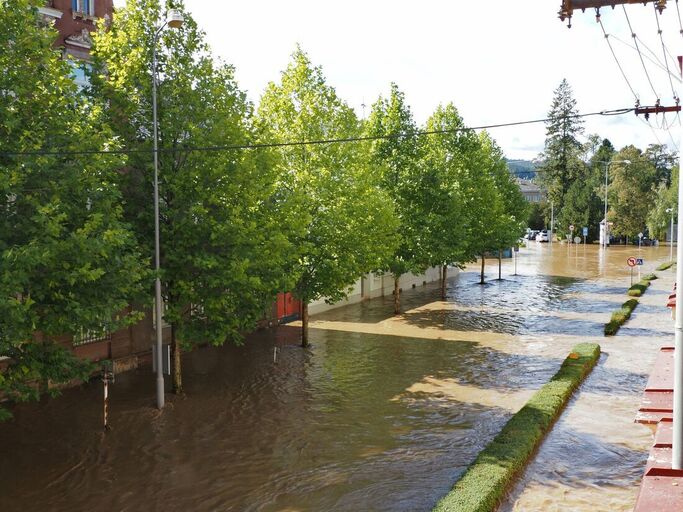Diary of the flood in 2024
Štěpán Janča, the minister of Krnov, wrote a flood diary about the days of the flood in September 2024. The diary was originally published in the magazine Český Bratr. You can now find an English translation below.
The third weekend in September brought heavy rainfall. Extreme amounts of rain fell over the Jeseníky Mountains and the water flowing down the riverbeds caused billions of euros worth of damage; unfortunately, it also claimed several lives. This is what we experienced in the Krnov congregation...
Week 9-13 September
The meteorologists are predicting rain for the weekend. We plan a Sunday ‘pilgrimage’ to the Krasov preaching station - an eight-kilometre walk over the hill, a church service and a barbecue.
Thursday, 12.9.
It has started to rain. It doesn't look too bad! It just drizzles most of the time. We are reassured because the ground is completely dry, a light rain will do the landscape good. We've been praying for moisture all summer!
Friday, 13.9.
The rain continues. The witnesses from ‘97 have stopped smiling. At the prayer meeting we pray that the flood won't come. We agree to skip the barbecue on Sunday. The church service should stay. What about the hill crossing? We're not made of sugar! We'll go whatever the weather.
Saturday, 14.9.
It's still raining. In the evening I call Krasov to find out what the situation is like. ‘The road is under water, you can't get through.’ We cancel the church service and the ‘pilgrimage’.
Tomorrow I'm supposed to hold a service in Bruntál, which I administer. After a few phone calls, we agree not to try. The people from Bruntál will organise the service themselves (a wise decision - the village of Bruntál was flooded in the morning and the road was impassable).
Friends send photos of the rising rivers and flooded gardens. At around six o'clock, a siren sounds from the local paging system. It wails for a long time and then announces that a flood wave is imminent. What does that mean? We have no idea. Are we to be evacuated? Or what? As a precaution, we fill up a few pots with water and charge our powerbanks. In the evening we see that there is water in the streets by the rivers. On one side the Opavice, on the other the Opava - usually streams with knee-deep water.
Sunday 15.9.
From bed straight to the window. The road is dry and the rain has stopped. A pleasantly warm sun shines from the blue sky.
They switched off the electricity during the night. It reminds us of a tent camp. I go to church; probably nobody will come, but if they do, at least we'll pray. A check from the balcony: a small stream flows through the alley behind the church. It rushes down the one-way street in the opposite direction and disappears into the canal in Albrechtická Street. I make my way to the canal and take a look at the situation. There is a river flowing on Mikulášská Street behind the church. People are standing on the pavement and staring. By the time I've walked round the church, I'm already wading through water here too.
I check the cellar. So far so good, only ankle-deep. I take out the last of my valuables.
I grab my camera and go back outside - I have to document this. The church is an island. I cross Mikulášská Street, past the theatre, towards the Albert supermarket and stare uncomprehendingly at the rapids that separate me from it. Revoluční Street has turned into a raging torrent, I'm not going to try that, I'm already knee-deep in water. I turn round and drive into town.
The flooded roundabout, in the middle of which a construction container has landed, looks somewhat surreal. I don't think I would trust a pedestrian crossing sign now, it's barely half a metre above the water. The parking machines at the clinic are also bizarre.
I drive home. I'm now halfway up my thighs in water. It rises and flows into the garden around the canteen. Soon it flows in from the main road too. A deep lake forms at the junction with the gardens. We stand on the driveway with our neighbours and watch the situation in disbelief.
I can't call anyone. Only the occasional text message comes through. The internet is also down. We have no information. We shout from the balcony to the police officers who are standing on the wall opposite the office and observing the situation. We ask what the outlook is, but they are in the same position as us - no connection and no information. We have no idea that we're not the only ones and that it's even worse elsewhere: Vidnava, Mikulovice, Zátor, Holčovice, Kateřinky, Nová Ves...
The rise in the water level only slows down at around 4 o'clock and the water starts to recede at around 5 o'clock. We take the opportunity to take the dog for a walk. We reach the corner of the shop. People everywhere are surveying the damage. The disaster is getting closer.
Monday, 16.9.
In the morning, the road is already without water again. Cars are driving through the mud. The telephone is not working, the electricity has failed and the water has been turned off. The gas is hissing normally. Is that safe?
We process vegetables from a defrosting freezer. We load a pot of soup onto the bike and set off to see how those who live closer to the water are doing. By the time we reach the market square, we are muddy up to our ears.
It's unbelievable what the water has done in one afternoon! Mud deposits, washed-out pavements, torn up tarmac, holes instead of pavements... We talk to people who had water in their homes. They drag out destroyed furniture, washing machines and fridges.
We hear stories that make our hair stand on end. ‘On the other side of the street, there was a note in the neighbour's window saying ‘SOS’. But a torrent was pouring down the street, there was no way to get in, the phone wasn't working, there was no way to call for help. We just hoped they could save themselves!’ They did. They climbed the stairs and broke into a neighbour's flat. They spent the night there, soaked and afraid of what was to come. At home, the water was almost up to the ceiling.
I notice where the water has raged everywhere: in the petrol station, in the shops, in the information centre, in the Minorite monastery, in the synagogue, in the banks. Salvation Army, Caritas, Diaconia, everything under water. Schools, offices, pubs. Contemporary witnesses compare the situation with that of 1997, saying that the flood was less severe that year and did not last as long, but at its peak the water level rose at least 20 cm higher. 80% of the city was under water.
We still have no signal, no electricity and no water. We are beginning to appreciate the achievements of civilisation that we took for granted. We are very grateful for the sunshine and the warmth. But many are beginning to fear winter. Who knows whether the flooded boilers can be put back into operation and whether the soaked walls can be dried out a little.
A romantic evening by candlelight - that's all we can do. The town is darker than ever before, with only a generator humming on the other side of the road from the police station to power a spotlight.
Tuesday, 17.9.
We inspect the cellar - the water has gone down, the larger part is now accessible, in the deeper part it will still be above our knees. We have to get wellies so that we can get in. A car with a megaphone drives through the streets and announces new news. Before we can run to the windows, it drives off and we can only guess what they were shouting.
In the afternoon, the phones start ringing again. We call our family to tell them we're okay, and friends and church members to find out how they survived. Only now do we learn that other villages and towns have also been flooded.
There is water and electricity in the parsonage in Opava. We will try to go there this afternoon - if the road is passable - to get a few canisters and charge our mobile phones. And we have to get the boots so that we can finally go into the cellar.
We got through without any problems. We've replenished the water and electricity, but the wellies are hopeless. As a precaution, I withdraw some money from the cash machine for the next few days.
In the evening, friends call and first aiders offer their help. The people of Těšín have organised three cars with workers. ‘What should we take with us?’ Rubber boots in all sizes, gloves, a generator, cleaning agents, tools, water...
Wednesday, 18.9.
They arrived before 8am. We unload the contraband and divide up the work groups. The main group descends into the cellar and over the course of the morning does a job that I myself would have struggled with for a month. Pulling out the rubbish, pumping out the water, spraying out the mud... By the evening, the cellar is empty and the dryer is humming.
And we can send more teams to the surrounding area: Libušina, Chomýž, Brantice. Everywhere there is a picture of destruction and people who are extremely grateful that someone is looking after them and helping them.
Eventually I made it to Bruntál. Only one road was affected there. Unfortunately for our congregation - the street ‘U potoka’ [by the stream] is not a good address during floods. Fortunately, the flat and the oratory are elevated and the water didn't get there, but the water was half a metre high in the cellar and the annex. Chairs, tables, kitchen units, cupboards and doors were ripped out; floors and wooden panelling had to be removed. Praise God for some volunteers who came to help here too.
Martin Balcar from the central church office called, conveyed greetings from the synodal council and began to organise help. Many congregations are collecting and sending groups of helpers. Thank God for a church that sticks together, thank God for brothers and sisters who are prepared to carry the burdens of others...
The workers have brought several boxes of bread rolls.
Thursday, 19.9.
In the morning, the electricity is switched on again. A car with a megaphone announces that there will also be water, but only for domestic use, not even boiled water can be drunk. But at least we can flush the toilet.
I go to other affected parishioners and kind souls and enquire how they are doing; I have the feeling that I have not made as many phone calls in three years in Krnov as I have now in two days.
Thanks to the generosity of the brothers and sisters, we are able to distribute materials and supplies - the parsonage is full of boxes of cleaning supplies, water and food, tools and - of course - wellies.
A brother came from Orlova and brought a large generator. We will lend it to Brantice. It will help several neighbours at once. Temporary workers from Brno arrived at midnight. Tomorrow morning they will also go to Brantice.
Friday, 20.9.
The Balcars have arrived from Prague. They explore the situation in order to organise effective support. We walk through the town together and visit the curator. The destruction in the village by the stream is even more obvious than in the town. Broken fences, washed-out streets, uprooted trees, several houses in ruins.
I pop into the contact centre to see what they need. Tomorrow the brigade can bring in more material and equipment. The needs change from day to day. Yesterday they needed generators, today the demand is saturated. Money has no value here at the moment. The shops are closed, so there's nowhere to spend it. Their time will surely come, but at the moment donations in kind are much more urgently needed and the hands of helpers even more so.
Older youths arrive in the evening. They will spend the night in the parsonage and are not bothered by the fact that there is no heating in the house and the shower is cold. Tomorrow they will split up into working groups and go to different places in Krnov and Brantice to help.
Saturday, 21.9.
A strain on the organisational talent. I, the proverbial slob, am trying to reconcile the demands of around 50 workers with the 30 or so new people who have joined us. We have young people, the Těšín people are back. The phone rings almost constantly. Finally, the unbelievable is coming true - we have helped absolutely everyone on our list and none of the helpers have gone unused.
It is very encouraging to see the gratitude of the people we have been able to help in this acute emergency. It is a great encouragement for them to know that someone is thinking of them and will come to them. It is not only physical labour that helps, but also talking and listening. The volunteers go home exhausted, but with the good feeling of having spent the day well.
Sunday, 22.9.
Church services in Krnov almost normal. There's just no electricity in the church yet. But that doesn't matter, we can sing with guitars and the minister can fill the room with sound even without loudspeakers. There are twice as many of us as usual - there are brothers and sisters from the Salvation Army, where all the buildings have been destroyed. A very nice ecumenical community.
In the afternoon, the Diaconia has announced its arrival - they are bringing us dryers. Great, we're going to need them urgently. And for a long time. On the second day, they were already blowing at various people and institutions - in family homes, in the bakery and even at the headquarters of the Silesian Diaconia. It doesn't matter that they are ‘competitors’.
I won't go into the next few days. Things are slowly getting back on track, some businesses are gradually resuming operations, the city is cleaning up the streets and a huge amount of rubbish from the flooded areas is being dumped at the large landfill site at the railway station. People are working and cleaning up, but you can see that they are running on their last legs.
After the adrenaline-fuelled euphoria comes great fatigue. The removal of the damage is dragging on. The flooded areas will not be usable for several months, probably not until spring. Those whose homes have been flooded are staying with relatives or friends. There are fewer volunteers; firefighters, soldiers and prisoners have left.
The autumn weather is beautiful, but in the morning it feels like winter is just around the corner. This year's Christmas will not be very pleasant for many people.
The damage is being totted up. You realise what all the insurance companies have written somewhere in teeny-tiny letters. At this point, money is once again of great importance. Utility bills are paid, new boilers and other appliances are bought. And for a while, we will wake up in horror when a few drops of rain hit the roof.
It turned out well for the Krnov congregation. Only the cellar. We are grateful to the Lord God for that. By not having to worry so much about our own damage, we can provide help to those who are much worse off. We are truly grateful for the support of the church. It is precisely in situations like this that the cohesion of the body of Christ is revealed.
We have opened the church to people who are affected and need a moment to take a deep breath, to cry, to pause for a moment or even just to drink tea. We are planning a series of Advent concerts, the proceeds of which will go to the Silesian Diaconia Special Needs School, which was severely devastated by the floods. And we pray that we will be a support to all those who need it.
Article and photos: Štěpán Janča, minister of the Krnov parish



